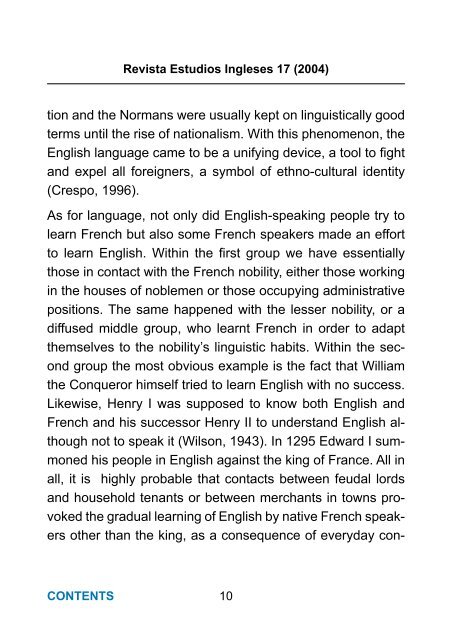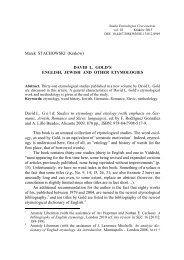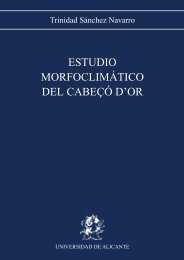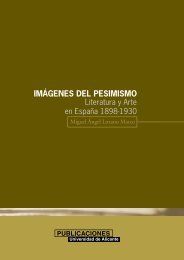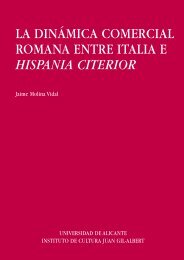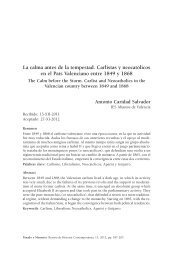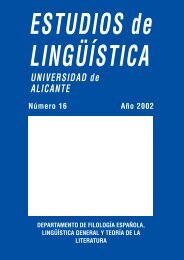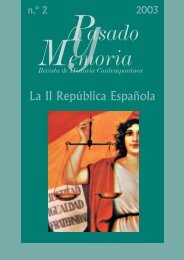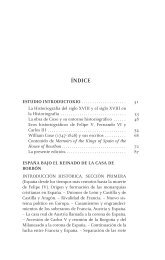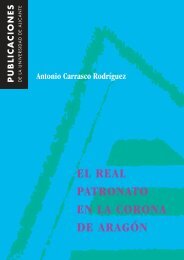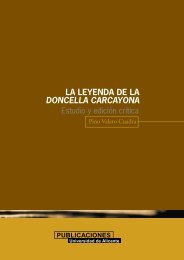English and Galician in the Middle Ages - Publicaciones ...
English and Galician in the Middle Ages - Publicaciones ...
English and Galician in the Middle Ages - Publicaciones ...
Create successful ePaper yourself
Turn your PDF publications into a flip-book with our unique Google optimized e-Paper software.
Revista Estudios Ingleses 17 (2004)<br />
tion <strong>and</strong> <strong>the</strong> Normans were usually kept on l<strong>in</strong>guistically good<br />
terms until <strong>the</strong> rise of nationalism. With this phenomenon, <strong>the</strong><br />
<strong>English</strong> language came to be a unify<strong>in</strong>g device, a tool to fi ght<br />
<strong>and</strong> expel all foreigners, a symbol of ethno-cultural identity<br />
(Crespo, 1996).<br />
As for language, not only did <strong>English</strong>-speak<strong>in</strong>g people try to<br />
learn French but also some French speakers made an effort<br />
to learn <strong>English</strong>. With<strong>in</strong> <strong>the</strong> fi rst group we have essentially<br />
those <strong>in</strong> contact with <strong>the</strong> French nobility, ei<strong>the</strong>r those work<strong>in</strong>g<br />
<strong>in</strong> <strong>the</strong> houses of noblemen or those occupy<strong>in</strong>g adm<strong>in</strong>istrative<br />
positions. The same happened with <strong>the</strong> lesser nobility, or a<br />
diffused middle group, who learnt French <strong>in</strong> order to adapt<br />
<strong>the</strong>mselves to <strong>the</strong> nobility’s l<strong>in</strong>guistic habits. With<strong>in</strong> <strong>the</strong> second<br />
group <strong>the</strong> most obvious example is <strong>the</strong> fact that William<br />
<strong>the</strong> Conqueror himself tried to learn <strong>English</strong> with no success.<br />
Likewise, Henry I was supposed to know both <strong>English</strong> <strong>and</strong><br />
French <strong>and</strong> his successor Henry II to underst<strong>and</strong> <strong>English</strong> although<br />
not to speak it (Wilson, 1943). In 1295 Edward I summoned<br />
his people <strong>in</strong> <strong>English</strong> aga<strong>in</strong>st <strong>the</strong> k<strong>in</strong>g of France. All <strong>in</strong><br />
all, it is highly probable that contacts between feudal lords<br />
<strong>and</strong> household tenants or between merchants <strong>in</strong> towns provoked<br />
<strong>the</strong> gradual learn<strong>in</strong>g of <strong>English</strong> by native French speakers<br />
o<strong>the</strong>r than <strong>the</strong> k<strong>in</strong>g, as a consequence of everyday con-<br />
CONTENTS<br />
10


